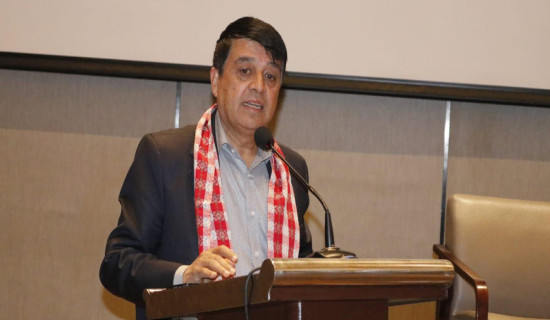- Sunday, 1 February 2026
Linking Security With Development
Development - whether it is physical or social - consistently demands robust security to ensure its quality and timely completion without any hindrances. And effective security is best realised when there exists sustained development, as both are two sides of the same coin, bringing peace and tranquillity to the country.
The comprehensive development of the national economy, well-being of society, effectiveness of political governance and advancement of the quality of people's life constitute the major concerns of modern-day governments and their citizens. In pursuit of these objectives, multifaceted policies, plans and programmes are formulated and designed for effective implementation. If the set-policy initiatives fail to materialise in their actual fields, there emerges a risk of policy inertia and public disappointment, creating a 'stoicism trap'.
Robust growth
The heart of development lies in the robust growth of the national economy that creates a solid foundation for a nation to be stronger and its people morally sturdier. If a country's economic growth progresses at a sluggish pace or becomes stagnant, the sufferers will only be its citizens, not the other actors that may foster a climate of fear, which can inhibit them from taking risks for engaging in innovative work. Recently, following the unprecedented and painful incidents of September 8-9, the World Bank revised the previous projection of Nepal's economic growth rate for the 2025/2026 fiscal year from 5.2 per cent to 2.1 percent. This is a serious concern for all.
There is a general perception among businesspeople that both foreign and domestic investment will decline significantly in the coming days because of the recent surge in insecurity. When the Nepali entrepreneurs were met with an insolent response through the destruction of their establishments, the graph of fear escalated to its highest level. It is a challenging task for the government to restore its confidence in the assurance of securing uninterrupted security for doing business smoothly.
Once the economic development gains a better shape in the country, several doors for employment are opened up, enabling people to pursue both self-employment and wage-based employment opportunities. This positive shift nurtures people's trust in the government's policy implementation, lowering public dissatisfaction and strengthening the national image. As the positive trajectory of development addresses the root causes of public dissatisfaction, such as poverty, unemployment, inequality, and poor governance, it lays a foundation for a resilient and peaceful society. In this environment, security vulnerabilities are significantly lessened, and harmonious relations between the government and the people are strengthened.
Once a congenial milieu for foreign capital investment and technology transfer is established, the national image – both domestically and internationally – emerges. The inexorable rise of technology changes the landscape of industrial growth. As a result, the probability of high or mid-intensity internal disturbances occurring due to people's dissatisfaction is greatly minimised. The root causes behind the 10-year-long Maoist insurgency and the recent Gen Z movements can be largely attributed to weak governance and the persistent underperformance of successive governments since 1990. This entire picture of the past reveals the fact that the nation's main goal should be based on ensuring human security through robust development of the country. When people's primary needs are addressed and their dignity is protected effectively, internal conflicts and unrest decline meaningfully.
From the 2000s to the present, the UN Millennium Development Goals of 2000 and the Sustainable Development Goals of 2015 meticulously underscored the indispensable role of peace in achieving them. These UN agendas, founded on the principle of 'no development without peace and no peace without development', constitute security as a prerequisite as well as a consequence of development across all sectors of national life. Nepal's national security policy-2019 designates development as one of the fundamental pillars of internal security.
Security is linked to development through two approaches. Firstly, it ensures that developmental initiatives are completed within the given timeframe and estimated cost. For this, security is essential to enable smooth functioning without any threats. This involves the presence and active role of security personnel. A threat to economic, physical, or social development can arise capriciously at any time and in any place, from any element – seen or hidden – and therefore requires protection not only during their initial stages but also after the completion. Integrating security entails the deployment of governmental or professionally trained private security personnel during the commissioning phase of the projects, ensuring the active participation of local communities and relevant stakeholders.
Belongingness
Generally speaking, in the past, there was a widespread tendency to overlook the interconnection between security and developmental initiatives, which persists to a considerable extent, causing substantial losses to various developmental projects. Secondly, upon completion, projects must guarantee that their outcomes genuinely respond to the needs and aspirations of the people. Such commitment cultivates an environment and sustains peace in society. Upon project completion, it is imperative to foster a sense of belongingness among the local populace, significantly mitigating both external and internal security threats.
In the past, the government did not place sufficient emphasis on connecting security with its development functions, which led to delays in various projects and other initiatives. One of the reasons contributing to the incompletion of projects on time was insecurity. This situation has deeply eroded public trust in the government. Recently, the government decided to terminate dozens of long-delayed projects that had remained incomplete for years beyond their original deadlines. It represents a positive step towards ensuring that negligence and non-performance will no longer be tolerated.
(The author is former secretary of the Nepal government.)















